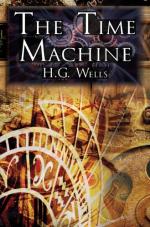’The great triumph of Humanity I had dreamed of took a different shape in my mind. It had been no such triumph of moral education and general co-operation as I had imagined. Instead, I saw a real aristocracy, armed with a perfected science and working to a logical conclusion the industrial system of to-day. Its triumph had not been simply a triumph over Nature, but a triumph over Nature and the fellow-man. This, I must warn you, was my theory at the time. I had no convenient cicerone in the pattern of the Utopian books. My explanation may be absolutely wrong. I still think it is the most plausible one. But even on this supposition the balanced civilization that was at last attained must have long since passed its zenith, and was now far fallen into decay. The too-perfect security of the Upper-worlders had led them to a slow movement of degeneration, to a general dwindling in size, strength, and intelligence. That I could see clearly enough already. What had happened to the Under-grounders I did not yet suspect; but from what I had seen of the Morlocks—that, by the by, was the name by which these creatures were called—I could imagine that the modification of the human type was even far more profound than among the “Eloi,” the beautiful race that I already knew.
’Then came troublesome doubts. Why had the Morlocks taken my Time Machine? For I felt sure it was they who had taken it. Why, too, if the Eloi were masters, could they not restore the machine to me? And why were they so terribly afraid of the dark? I proceeded, as I have said, to question Weena about this Under-world, but here again I was disappointed. At first she would not understand my questions, and presently she refused to answer them. She shivered as though the topic was unendurable. And when I pressed her, perhaps a little harshly, she burst into tears. They were the only tears, except my own, I ever saw in that Golden Age. When I saw them I ceased abruptly to trouble about the Morlocks, and was only concerned in banishing these signs of the human inheritance from Weena’s eyes. And very soon she was smiling and clapping her hands, while I solemnly burned a match.




